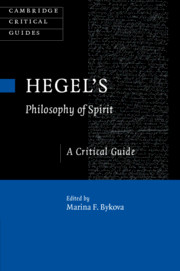Book contents
- Hegel’s Philosophy of Spirit
- Cambridge Critical Guides
- Hegel’s Philosophy of Spirit
- Copyright page
- Contents
- Contributors
- Acknowledgments
- Abbreviations
- Introduction
- Part I Philosophy of Spirit and Hegel’s Philosophical System
- Part II Philosophy of Subjective Spirit
- Part III Philosophy of Objective Spirit
- Chapter 6 The Idea of a Speculative Philosophy of Objective Spirit
- Chapter 7 Objective Spirit
- Chapter 8 On Hegel’s Account of Selfhood and Human Sociality
- Chapter 9 Hegel’s Idea of the State
- Part IV Philosophy of Absolute Spirit
- Bibliography
- Index
- Cambridge Critical Guides
Chapter 9 - Hegel’s Idea of the State
from Part III - Philosophy of Objective Spirit
Published online by Cambridge University Press: 24 June 2019
- Hegel’s Philosophy of Spirit
- Cambridge Critical Guides
- Hegel’s Philosophy of Spirit
- Copyright page
- Contents
- Contributors
- Acknowledgments
- Abbreviations
- Introduction
- Part I Philosophy of Spirit and Hegel’s Philosophical System
- Part II Philosophy of Subjective Spirit
- Part III Philosophy of Objective Spirit
- Chapter 6 The Idea of a Speculative Philosophy of Objective Spirit
- Chapter 7 Objective Spirit
- Chapter 8 On Hegel’s Account of Selfhood and Human Sociality
- Chapter 9 Hegel’s Idea of the State
- Part IV Philosophy of Absolute Spirit
- Bibliography
- Index
- Cambridge Critical Guides
Summary
Hegel’s philosophy of “subjective spirit” in his Encyclopaedia (1830) shows that the human spirit, when fully developed, takes the form of “free will, which is for itself as free will” (Enc. 3I §481). In his account of “objective spirit” Hegel then shows that the free will – insofar as it is rational, rather than merely arbitrary – conceives of freedom as something both individual and universal. Freedom, for Hegel, belongs to the self-conscious individual; yet at the same time, as the object of a rational will, “freedom and its content … are the universal in itself” (Enc. 3I §485). This means not only that freedom belongs in principle to all self-conscious individuals, but also that it has a rational character of its own that individuals must recognize if they are to be truly free.
- Type
- Chapter
- Information
- Hegel's Philosophy of SpiritA Critical Guide, pp. 186 - 204Publisher: Cambridge University PressPrint publication year: 2019

